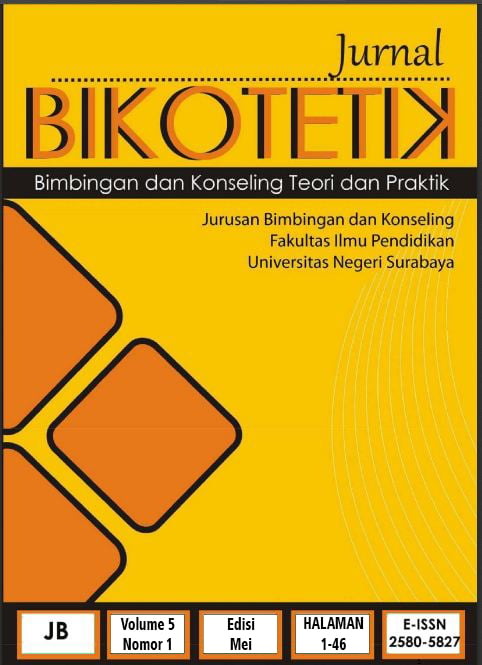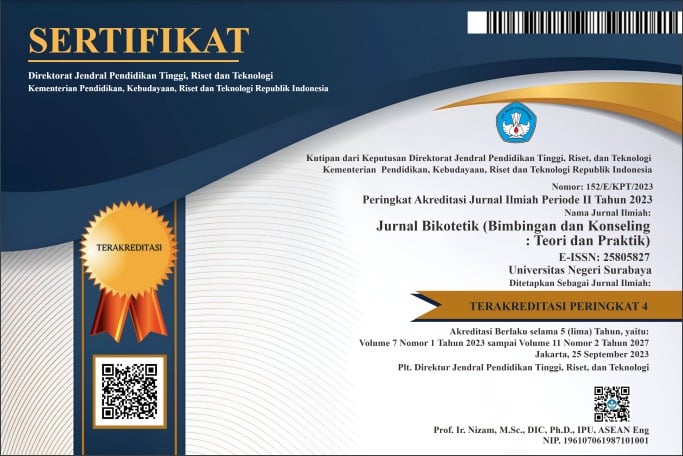KETERBUKAAN DIRI SEBAGAI PREDIKTOR KESEJAHTERAAN PSIKOLOGIS SISWA
DOI:
https://doi.org/10.26740/bikotetik.v5n1.p33-42Keywords:
Psychological Well-Being, Self Disclosure, Social Media, StudentsAbstract
Rendahnya kesejahteraan psikologis menunjukkan adanya ketidakmampuan siswa dalam melakukan tugas perkembangannya. Penelitian saat ini ditujukan untuk menguji pengaruh dari keterbukaan diri siswa pada media sosial terhadap kesejahteraan psikologisnya. Desain penelitian yang digunakan adalah ex post facto. Teknik sampel yang digunakan adalah teknik cluster proportionate stratified random sampling. Melalui teknik sampel tersebut, maka diperoleh sampel data sebanyak 306 siswa dari 2048 siswa tingkat sekolah menengah atas di kecamatan semarang tengah. Alat pengumpulan data yang digunakan adalah Skala Keterbukaan Diri yang berjumlah 18 item pernyataan dengan koefisiensi reliabilitas 0,777 dan instrumen Skala Kesejahteraan Psikologis yang berjumlah 24 item pernyataan yang memiliki koefisiensi reliabilitas yaitu 0,759. Data dianalisis menggunakan uji regresi linier sederhana sehingga diperoleh hasil yaitu keterbukaan diri pada media sosial mempengaruhi kesejahteraan psikologis siswa di SMA se-Kecamatan Semarang Tengah (R2 = 0,249; p < 0,05). Berdasarkan hasil uji hipotesis tersebut, maka guru Bimbingan dan Konseling dapat memanfaatkan keterbukaan diri siswa pada media sosial untuk meningkatkan kesejahteraan psikologis melalui layanan dalam jaringan. Penelitian selanjutnya diharapkan dapat meneliti topik ini dengan menggunakan metode penelitian yang lain seperti metode eksperimen.References
<p>Abramova, O., Krasnova, H., Wagner, A., & Buxmann, P. (2017). Understanding self-disclosure on social networking sites - a literature review. <em>AMCIS 2017 - Americas Conference on Information Systems: A Tradition of Innovation</em>, <em>2017</em>-<em>Augus</em>(August).</p><p>Amosun, T. S., Jianxun, C., Rufai, O. H., Muhideen, S., Shahani, R., Shah, Z., & Koroma, J. (2020). <em>WeChat usage during COVID-19 pandemic lockdown¯: the mediating role of online self-disclosure on quality of friendship and well-being</em>. https://doi.org/10.1108/GKMC-09-2020-0136</p><p>Ampong, G. O. A., Mensah, A., Adu, A. S. Y., Addae, J. A., Omoregie, O. K., & Ofori, K. S. (2018). Examining self-disclosure on social networking sites: A flow theory and privacy perspective. <em>Behavioral Sciences</em>, <em>8</em>(6), 117. https://doi.org/10.3390/bs8060058</p><p>APJII. (2018). <em>Profil Pengguna Internet Indonesia 2018</em>. http://www.apjii.or.id</p><p>Arpaci, I. (2020). <em>What drives students online self-disclosure behaviour on social media¯? A hybrid SEM and artificial intelligence approach</em>. <em>18</em>(2).</p><p>Bano, S., Cisheng, W., Nawaz, A., & Abbas, N. (2019). Children and Youth Services Review WhatsApp use and student s psychological well-being¯: Role of social capital and social integration. <em>Children and Youth Services Review</em>, <em>103</em>(February), 200208. https://doi.org/10.1016/j.childyouth.2019.06.002</p><p>Bazarova, N. N., & Choi, Y. H. (2014). Self-disclosure in social media: Extending the functional approach to disclosure motivations and characteristics on social network sites. <em>Journal of Communication</em>, <em>64</em>(4), 635657. https://doi.org/10.1111/jcom.12106</p><p>Beattie, T. S., Prakash, R., Mazzuca, A., Kelly, L., Javalkar, P., Raghavendra, T., Ramanaik, S., Collumbien, M., Moses, S., Heise, L., Isac, S., & Watts, C. (2019). Prevalence and correlates of psychological distress among 13-14 year old adolescent girls in North Karnataka, South India: A cross-sectional study. <em>BMC Public Health</em>, <em>19</em>(1), 112. https://doi.org/10.1186/s12889-018-6355-z</p><p>Chen, H., & Li, X. (2017). Computers in Human Behavior The contribution of mobile social media to social capital and psychological well-being¯: Examining the role of communicative use , friending and self-disclosure. <em>Computers in Human Behavior</em>, <em>75</em>, 958965. https://doi.org/10.1016/j.chb.2017.06.011</p><p>Cheng, X., Fu, S., & de Vreede, G. J. (2017). Understanding trust influencing factors in social media communication: A qualitative study. <em>International Journal of Information Management</em>, <em>37</em>(2), 2535. https://doi.org/10.1016/j.ijinfomgt.2016.11.009</p><p>Clark-Gordon, C. V., Bowman, N. D., Goodboy, A. K., & Wright, A. (2019). Anonymity and Online Self-Disclosure: A Meta-Analysis. <em>Communication Reports</em>, <em>32</em>(2), 98111. https://doi.org/10.1080/08934215.2019.1607516</p><p>Dhir, A., Kaur, P., Chen, S., & Pallesen, S. (2019). International Journal of Information Management. <em>International Journal of Information Management</em>, <em>48</em>(May), 193202. https://doi.org/10.1016/j.ijinfomgt.2019.05.021</p><p>Dogan, U. (2016). Effects of social network use on happiness, psychological well-being, and life satisfaction of high school students: Case of facebook and twitter. <em>Egitim ve Bilim</em>, <em>41</em>(183), 217231. https://doi.org/10.15390/EB.2016.4616</p><p>Erfani, S. S. (2018). <em>Impacts of the Use of Social Network Sites on Users Psychological Well-being¯: A Systematic Review</em>. <em>00</em>(00). https://doi.org/10.1002/asi</p><p>Ernala, S. K., Labetoulle, T., Bane, F., Birnbaum, M. L., Rizvi, A. F., Kane, J. M., & Choudhury, M. De. (2018). <em>Characterizing Audience Engagement and Assessing Its Impact on Social Media Disclosures of Mental Illnesses</em>. <em>Icwsm</em>, 6271.</p><p>Fauziawati, W. (2014). Upaya Mereduksi Kebiasaan Bermain Game Online Melalui Teknik Diskusi Kelompok. <em>Jurnal Bimbingan Dan Konseling</em>, <em>4</em>(2), 115123.</p><p>Gainau, M. B. (2019). Self-disclosure effect on cultural context of Papuan teenagers. <em>International Journal of Social Sciences and Humanities</em>, <em>3</em>(2), 6270. https://doi.org/10.29332/ijssh.v3n2.293</p><p>Galiana, L., Tomás, J. M., Fernández, I., & Oliver, A. (2020). Predicting Well-Being Among the Elderly: The Role of Coping Strategies. <em>Frontiers in Psychology</em>, <em>11</em>(April), 18. https://doi.org/10.3389/fpsyg.2020.00616</p><p>Hakim, S. N., & Raj, A. A. (2017). Dampak kecanduan internet (internet addiction) pada remaja. <em>Jurnal UNISSULA</em>, <em>978</em>-<em>602</em><em>22</em>(2), 280284. jurnal.unissula.ac.id/index.php/ippi/article/download/2200/1662</p><p>Henn, C. M., Hill, C., & Jorgensen, L. I. (2016). An investigation into the factor structure of the Ryff scales of psychological well-being. <em>SA Journal of Industrial Psychology</em>, <em>42</em>(1), 112. https://doi.org/10.4102/sajip.v42i1.1275</p><p>Horwood, S., & Anglim, J. (2019). Computers in Human Behavior Problematic smartphone usage and subjective and psychological well-being. <em>Computers in Human Behavior</em>, <em>97</em>(February), 4450. https://doi.org/10.1016/j.chb.2019.02.028</p><p>Howard, C. (2014). <em>Social Media and Young Adults Well-Being</em>. FHSU Schoolar.</p><p>Imai, T., & Imai, A. (2019). Cross-Ethnic Self-Disclosure Buffering Negative Impacts of Prejudice on International Students Psychological and Social Well-Being. <em>Journal of International Students</em>, <em>9</em>(1), 6683. https://doi.org/10.32674/jis.v9il.279ojed.org/jis</p><p>Jannah, N., Mudjiran, M., & Nirwana, H. (2015). Hubungan Kecanduan Game dengan Motivasi Belajar Siswa dan Implikasinya Terhadap Bimbingan dan Konseling. <em>Konselor</em>, <em>4</em>(4), 200. https://doi.org/10.24036/02015446473-0-00</p><p>Karsay, K., & Stevic, A. (2019). <em>Longitudinal Effects of Excessive Smartphone Use on Stress and Loneliness¯: The Moderating Role of Self-Disclosure</em>. <em>22</em>(11), 706713. https://doi.org/10.1089/cyber.2019.0255</p><p>Keles, B., McCrae, N., & Grealish, A. (2020). A systematic review: the influence of social media on depression, anxiety and psychological distress in adolescents. <em>International Journal of Adolescence and Youth</em>, <em>25</em>(1), 7993. https://doi.org/10.1080/02673843.2019.1590851</p><p>Kelly, Y., Zilanawala, A., Booker, C., & Sacker, A. (2018). Social Media Use and Adolescent Mental Health: Findings From the UK Millennium Cohort Study. <em>EClinicalMedicine</em>, <em>6</em>, 5968. https://doi.org/10.1016/j.eclinm.2018.12.005</p><p>Kementrian Pendidikan dan Kebudayaan. (2016). <em>Panduan Operasional Penyelenggaraan Bimbingan Dan Konseling Sekolah Menengah Atas (SMA)</em>. 167. http://eprints.uny.ac.id/54129/1/1. PANDUAN BK SD 2016%2CDITJEN GTK revisi final 21 Des 2016.pdf</p><p>Kesi, S., Hartati, R., & Syaf, A. (2019). Kepuasan Hidup dengan Iri pada Remaja Pengguna Sosial Media. <em>Psychopolytan¯: Jurnal Psikologi</em>, <em>3</em>(1), 915. https://doi.org/10.36341/psi.v3i1.940</p><p>Koydemir, S., Sökmez, A. B., & Schütz, A. (2020). A Meta-Analysis of the Effectiveness of Randomized Controlled Positive Psychological Interventions on Subjective and Psychological Well-Being. <em>Applied Research in Quality of Life</em>. https://doi.org/10.1007/s11482-019-09788-z</p><p>Lee, Y. H., Hsiao, C., Weng, J., & Chen, Y. H. (2020). The impacts of relational capital on self-disclosure in virtual communities: A cross-level analysis of key moderators. <em>Information Technology and People</em>. https://doi.org/10.1108/ITP-11-2018-0541</p><p>Liu, D., Baumeister, R. F., Yang, C., & Hu, B. (2019). <em>Digital Communication Media Use and Psychological Well-Being¯: A Meta-Analysis</em>. <em>24</em>(October 2018), 259274. https://doi.org/10.1093/ccc/zmz013</p><p>Luo, M., & Hancock, J. T. (2020). Self-disclosure and social media: motivations, mechanisms and psychological well-being. <em>Current Opinion in Psychology</em>, <em>31</em>, 110115. https://doi.org/10.1016/j.copsyc.2019.08.019</p><p>Lyvers, M., Cutinho, D., & Thorberg, F. A. (2019). Alexithymia, impulsivity, disordered social media use, mood and alcohol use in relation to facebook self-disclosure. <em>Computers in Human Behavior</em>. https://doi.org/10.1016/j.chb.2019.09.004</p><p>Mackson, S. B., Brochu, P. M., & Schneider, B. A. (2019). <em>Instagram¯: Friend or foe¯? The application s association with psychological well-being</em>. https://doi.org/10.1177/1461444819840021</p><p>Mahdia, A. (2018). Pengaruh Konten Influencer Di Media Sosial Terhadap Kesejahteraan Psikologis Remaja Akhir. <em>Jurnal Psikologi</em>, <em>11</em>(2), 172179. https://doi.org/10.35760/psi.2018.v11i2.2262</p><p>Malin, H. (2017). Purpose and Character Development in Early Adolescence. <em>Journal of Youth and Adolescence</em>, 12001215. https://doi.org/10.1007/s10964-017-0642-3</p><p>Marisa, C., & Utami, S. (2021). <em>Information services with cooperative methods to improve student s self autonomy</em>. <em>1</em>(1), 110.</p><p>Martin, F., Wang, C., Petty, T., Wang, W., & Wilkins, P. (2018). International Forum of Educational Technology & Society Middle School Students Social Media Use. <em>Source: Journal of Educational Technology & Society</em>, <em>21</em>(1), 213224.</p><p>Menteri Pendidikan Nasional. (2008). <em>PERATURAN MENTERI PENDIDIKAN NASIONAL REPUBLIK INDONESIA NOMOR 27 TAHUN 2008</em>. 19.</p><p>Mulawarman, M., & Nurfitri, A. D. (2017). Perilaku Pengguna Media Sosial beserta Implikasinya Ditinjau dari Perspektif Psikologi Sosial Terapan. <em>Buletin Psikologi</em>, <em>25</em>(1), 3644. https://doi.org/10.22146/buletinpsikologi.22759</p><p>Pynnönen, K., Kokko, K., Saajanaho, M., Törmäkangas, T., Portegijs, E., & Rantanen, T. (2021). Do opposite ends of same factors underlie life satisfaction vs. depressive symptoms among older people? <em>Aging Clinical and Experimental Research</em>, <em>0123456789</em>. https://doi.org/10.1007/s40520-020-01765-z</p><p>Rahardjo, W., Qomariyah, N., Andriani, I., Hermita, M., & Zanah, F. N. (2020). Adiksi Media Sosial pada Remaja Pengguna Instagram dan WhatsApp: Memahami Peran Need Fulfillment dan Social Media Engagement. <em>Jurnal Psikologi Sosial</em>, <em>18</em>(1), 516. https://doi.org/10.7454/jps.2020.03</p><p>Ryff, C. D. (1989). Happiness is everything, or is it? Explorations on the meaning of psychological well-being. <em>Journal of Personality and Social Psychology</em>, <em>57</em>(6), 10691081. https://doi.org/10.1037/0022-3514.57.6.1069</p><p>Ryff, C. D. (1995). Psychological Well-Being in Adult Life. <em>Current Directions in Psychological Science</em>, <em>4</em>(4), 99104. https://doi.org/10.1111/1467-8721.ep10772395</p><p>Ryff, C. D. (2013). Psychological well-being revisited: Advances in the science and practice of eudaimonia. <em>Psychotherapy and Psychosomatics</em>, <em>83</em>(1), 1028. https://doi.org/10.1159/000353263</p><p>Ryff, C. D. (2018). Well-Being With Soul: Science in Pursuit of Human Potential. <em>Perspectives on Psychological Science</em>, <em>13</em>(2), 242248. https://doi.org/10.1177/1745691617699836</p><p>Ryff, C. D., & Singer, B. (1996). Psychological well-being: Meaning, measurement, and implications for psychotherapy research. <em>Psychotherapy and Psychosomatics</em>, <em>65</em>(1), 1423. https://doi.org/10.1159/000289026</p><p>Sudrajat, A. (2020). Apakah Media Sosial Buruk untuk Kesehatan Mental dan Kesejahteraan? Kajian Perspektif Remaja. <em>Jurnal Tinta</em>, <em>2</em>(1), 4152. https://doi.org/10.35897/jurnaltinta.v2i1.274</p><p>Sugiyo, Muslikah, Antika, E. R., & Sutikno, U. G. (2019). <em>Profil Psychological Well-Being pada Siswa Kelas X SMA Negeri 12 Semarang Tahun Pelajaran 2018 / 2019</em>. <em>2012</em>, 116120.</p><p>Szymanski, D. M., & Gupta, A. (2009). Examining the relationship between multiple internalized oppressions and African American lesbian, gay, bisexual, and questioning persons self-esteem and psychological distress. <em>Journal of Counseling Psychology</em>, <em>56</em>(1), 110118. https://doi.org/https://doi.org/10.1037/a0013317</p><p>Trepte, S., Masur, P. K., & Scharkow, M. (2018). Mutual friends social support and self-disclosure in face-to-face and instant messenger communication. <em>Journal of Social Psychology</em>, <em>158</em>(4), 430445. https://doi.org/10.1080/00224545.2017.1398707</p><p>Tsaniah, S. M., & Budiman, N. (2020). <em>Sociodrama to Develop Emotional Autonomy of the Adolescents</em>. <em>399</em>(Icepp 2019), 241245.</p><p>Upadhayay, V. (2018). Social Media Usage and Psychological Wellbeing among Indian Youth Affiliations. <em>International Journal of Stress Prevention and Wellbeing</em>, <em>2</em>, 112. www.nationalwellbeingservice.com/journals</p><p>Wang, C., Pan, R., Wan, X., Tan, Y., Xu, L., McIntyre, R. S., Choo, F. N., Tran, B., Ho, R., Sharma, V. K., & Ho, C. (2020). A longitudinal study on the mental health of general population during the COVID-19 epidemic in China. <em>Brain, Behavior, and Immunity</em>, <em>87</em>(April), 4048. https://doi.org/10.1016/j.bbi.2020.04.028</p><p>Wang, L., Yan, J., Lin, J., & Cui, W. (2017). Let the users tell the truth: Self-disclosure intention and self-disclosure honesty in mobile social networking. <em>International Journal of Information Management</em>, <em>37</em>(1), 14281440. https://doi.org/10.1016/j.ijinfomgt.2016.10.006</p><p>Wheeless, L. R., & Grotz, J. (1976). Conceptualization and Measurement of Reported SelfDisclosure. <em>Human Communication Research</em>, <em>2</em>(4), 338346. https://doi.org/10.1111/j.1468-2958.1976.tb00494.x</p><p>Wibowo, M. E., Mulawarman, M., & Purwanto, E. (2019). Problematic Internet Use in Semarang Middle School Students. <em>KnE Social Sciences</em>, <em>2019</em>, 461469. https://doi.org/10.18502/kss.v3i18.4737</p>Yusuf, A., Rachmawati, P. D., & Rachmawati, D. (2020). The correlation of Internet addiction towards adolescents social interaction. <em>International Journal of Adolescent Medicine and Health</em>. https://doi.org/10.1515/ijamh-2020-0110
Downloads
Published
2021-06-09
How to Cite
Soputan, S. D. M. (2021). KETERBUKAAN DIRI SEBAGAI PREDIKTOR KESEJAHTERAAN PSIKOLOGIS SISWA. Jurnal Bikotetik (Bimbingan Dan Konseling: Teori Dan Praktik), 5(1), 33–42. https://doi.org/10.26740/bikotetik.v5n1.p33-42
Issue
Section
Articles
 Abstract views: 1902
,
Abstract views: 1902
, PDF Downloads: 1241
PDF Downloads: 1241










